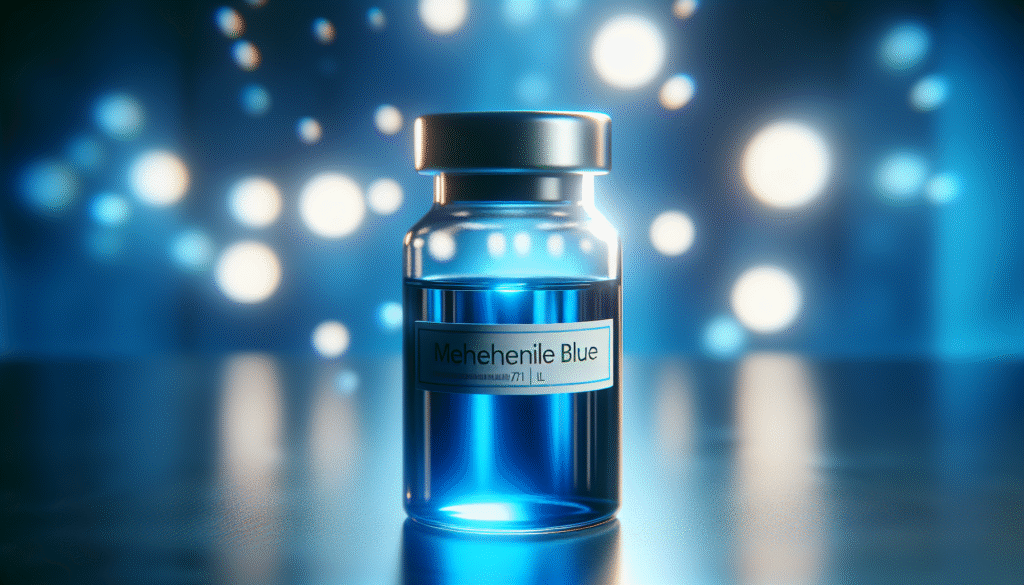
What if a simple compound could significantly enhance cognitive function and potentially alter the landscape of mental health treatment?
Understanding Methylene Blue
Methylene Blue (MB) is a synthetic dye that has gained attention beyond its initial use in chemistry and medical applications. Historically, it was used as a treatment for malaria and as a staining agent in various biological experiments. However, its potential in cognitive enhancement research is becoming increasingly evident.
This compound is gaining traction in the realms of psychology, neurology, and cognitive sciences due to its unique properties. Methylene Blue has been shown to enhance mitochondrial functioning and has antioxidant effects that protect neurons. Recent studies are exploring how these aspects can be leveraged for cognitive enhancement.
Historical Usage of Methylene Blue
Originally synthesized in the late 19th century, Methylene Blue has been utilized for a multitude of purposes. In medicine, it is recognized for treating conditions such as methemoglobinemia—an ailment resulting in the increased presence of methemoglobin, which cannot effectively carry oxygen. Within the scientific community, its role has encompassed various studies in microbiology and histology.
Today, the focus is shifting towards its implications in cognitive enhancement. This shift raises questions about how such a compound, with deep historical roots, can contribute to contemporary mental health strategies.
The Mechanisms of Action
Mitochondrial Enhancement
Mitochondria are the powerhouse of cells, generating adenosine triphosphate (ATP), which is essential for energy metabolism. Methylene Blue has been shown to improve mitochondrial function in several ways:
-
Facilitation of Electron Transport: MB acts as an alternative electron carrier in the mitochondrial respiratory chain. By enhancing the electron transport process, it helps improve the production of ATP.
-
Reduction of Oxidative Stress: The antioxidant properties of Methylene Blue combat free radicals, which can damage neuronal cells and contribute to various cognitive impairments.
-
Neuroprotection: By enhancing vascular function and reducing the risk of neurodegenerative diseases, Methylene Blue aids in maintaining cognitive health over time.
This multifaceted action on mitochondrial health provides a compelling rationale for its use in cognitive enhancement.
Neurotransmitter Modulation
Methylene Blue also impacts neurotransmitter pathways, specifically those involving serotonin and dopamine. These neurotransmitters play crucial roles in mood regulation, motivation, and cognitive function.
-
Dopamine Production: Dopamine is essential for several cognitive functions, including attention, memory, and decision-making. Research indicates that Methylene Blue could influence the availability and metabolism of this neurotransmitter.
-
Serotonin Levels: By increasing serotonin levels, Methylene Blue may provide benefits related to mood elevation and anxiety reduction, supporting overall cognitive performance.
Understanding the interaction of Methylene Blue with neurotransmitters opens up potential avenues for improving mental health outcomes.

Current Research Landscape
Studies Highlighting Cognitive Enhancement
Recent studies have begun to quantitatively assess the cognitive effects of Methylene Blue. For instance, research has indicated improvements in memory retention and learning as well as potential benefits for individuals suffering from cognitive decline.
One prominent study examined older adults with cognitive impairment and found that those administered Methylene Blue showed marked improvements in cognitive assessment scores compared to placebos.
Cognitive Enhancement in Healthy Individuals
Interestingly, research is not limited to individuals with cognitive disabilities. Healthy adults are also being targeted in these studies. Here, the objective is to determine whether Methylene Blue can enhance cognitive function in those without pre-existing conditions.
-
Memory Tests: In controlled trials, participants taking Methylene Blue have demonstrated enhanced performance in memory tasks.
-
Attention and Focus: Some studies have reported that participants experience increased attention and focus after Methylene Blue supplementation.
These findings suggest that Methylene Blue could be a valuable tool among the available cognitive enhancers.
Safety and Efficacy
Dosage Considerations
Despite the promising benefits, determining the correct dosage of Methylene Blue is crucial. In research settings, dosages have typically ranged from 0.5 mg/kg to 4 mg/kg. These dosages must be carefully assessed in future clinical trials to strike a balance between efficacy and safety.
Side Effects and Contraindications
While Methylene Blue is generally considered safe for short-term use, potential side effects can occur. These include:
-
Urine Discoloration: A common but harmless side effect is the staining of urine, which can turn blue or green.
-
Nausea and Gastrointestinal Distress: Some individuals may experience stomach upset after consumption.
Understanding the side effects is essential in ensuring informed decision-making about Methylene Blue supplementation.

Ethical Considerations
Cognitive Enhancement Debate
The very idea of cognitive enhancement raises philosophical and ethical questions. Should individuals enhance their cognitive abilities artificially when cognitive aids like Methylene Blue are available? What implications does this have for equity and access in society?
While cognitive enhancement could provide personal benefits, it could also contribute to widening the gap between individuals who can afford such treatments and those who cannot. Addressing these ethical concerns will be crucial as Methylene Blue gains prominence in this emerging field.
Regulation and Accessibility
As with any substance that has the potential for cognitive enhancement, the regulation of Methylene Blue will shape its accessibility. Balancing public safety and ensuring that individuals can access potentially beneficial treatments will be a challenge for policymakers.
The Role of Methylene Blue in Mental Health Treatment
Combating Neurodegenerative Diseases
Research indicates that Methylene Blue could play a significant role in managing neurodegenerative conditions such as Alzheimer’s and Parkinson’s diseases.
-
Alzheimer’s Disease: Some studies suggest that Methylene Blue may reduce the formation of amyloid plaques, a hallmark of Alzheimer’s disease.
-
Parkinson’s Disease: The neuroprotective effects of Methylene Blue, coupled with its ability to enhance mitochondrial function, position it as a potential treatment avenue for Parkinson’s patients as well.
Depression and Anxiety Management
Given its influence on neurotransmitter systems, Methylene Blue may serve as an adjunctive treatment for mood disorders such as depression and anxiety. By potentially increasing serotonin levels, it could offer therapeutic benefits that enhance traditional treatment approaches.
Future Directions in Research
Continued Exploration
The burgeoning interest in Methylene Blue suggests that future research will continue to unlock its cognitive enhancement potential. Long-term studies will be essential to determine its lasting effects and possible ramifications for public health.
Combination Therapies
Exploring the synergistic effects of Methylene Blue combined with other cognitive enhancers or traditional medicines may yield new insights. These combinations could provide greater benefits than either treatment alone.
Technological Advancements
With advancements in neuroimaging and biomarkers, scientists will be better equipped to measure Methylene Blue’s impact on the brain. This technological integration will enhance the precision and understanding of its cognitive effects.
Conclusion
The future of Methylene Blue in cognitive enhancement research holds promise, yet it remains accompanied by questions and considerations. By enhancing mitochondrial function and modulating neurotransmitter levels, Methylene Blue stands at the forefront of potential cognitive improvement therapies.
As research continues to unfold, maintaining an ethical framework surrounding its use will be instrumental. As you contemplate the implications of this compound, both in your own cognitive pursuits and broader societal impacts, it becomes clear that Methylene Blue could indeed be a pivotal player in the future of cognitive enhancement. The quest for knowledge will be the compass guiding this investigation.